Mentors
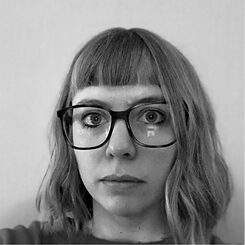 Jen Sykes
| © Jen Sykes
Jen Sykes is a visual-artist and lecturer based in Glasgow. Having graduated from the MFA in Computational Arts at Goldsmiths University of London in 2012, her work spans creative computing, sculpture and electronic hardware designs often connecting the physical analog and digital worlds. Her research focuses on using computer related materials to narrate qualities which normally lay dormant, invisible to the human eye. Alongside her practice Jen Sykes is a lecturer in Physical Computing and Interactive Prototyping at the Glasgow School of Art. She regularly teaches guest workshops on Creative Coding, Physical Computing and Creative Machine Learning at institutions and studios like Glasgow Sculpture Studios, LEGO, Normally Studios, CIID and Umeå Institute of Design and The Royal Academy of Architecture, Design and Conservation, Copenhagen.
Jen Sykes
| © Jen Sykes
Jen Sykes is a visual-artist and lecturer based in Glasgow. Having graduated from the MFA in Computational Arts at Goldsmiths University of London in 2012, her work spans creative computing, sculpture and electronic hardware designs often connecting the physical analog and digital worlds. Her research focuses on using computer related materials to narrate qualities which normally lay dormant, invisible to the human eye. Alongside her practice Jen Sykes is a lecturer in Physical Computing and Interactive Prototyping at the Glasgow School of Art. She regularly teaches guest workshops on Creative Coding, Physical Computing and Creative Machine Learning at institutions and studios like Glasgow Sculpture Studios, LEGO, Normally Studios, CIID and Umeå Institute of Design and The Royal Academy of Architecture, Design and Conservation, Copenhagen.
Activities in collaboration with New Forms of Togetherness:
Workshop: 07.04.2021
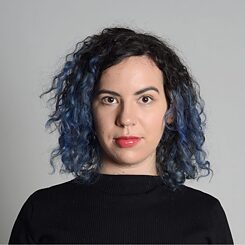 Caroline Sinders
| © Sarah Wang
Caroline Sinders is a machine-learning-design researcher and artist. For the past few years, she has been examining the intersections of technology’s impact in society, interface design, artificial intelligence, abuse, and politics in digital, conversational spaces. Caroline Sinders is the founder of ‘Convocation Design + Research’, an agency focusing on the intersections of machine learning, user research, designing for public good, and solving difficult communication problems. As a designer and researcher, she has worked with Amnesty International, Intel, IBM Watson, the Wikimedia Foundation, and others.
Caroline Sinders
| © Sarah Wang
Caroline Sinders is a machine-learning-design researcher and artist. For the past few years, she has been examining the intersections of technology’s impact in society, interface design, artificial intelligence, abuse, and politics in digital, conversational spaces. Caroline Sinders is the founder of ‘Convocation Design + Research’, an agency focusing on the intersections of machine learning, user research, designing for public good, and solving difficult communication problems. As a designer and researcher, she has worked with Amnesty International, Intel, IBM Watson, the Wikimedia Foundation, and others.Activities in collaboration with New Forms of Togetherness:
Workshop: 05.05.2021
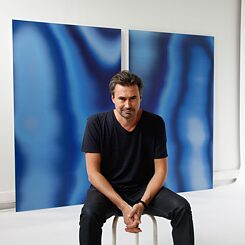 Pascal Dombis
| © Andreas Von Lintel
Pascal Dombis is a Paris based visual artist who focuses as much on language as on perception. He is noted for his excessive use of simple algorithmic rules. For more than two decades, he has been using computer algorithms to produce excessive repetitions and combinations of simple processes that create unpredictable, unstable and dynamic visual forms. He exploits the paradoxical co-existence of orderly control and chaotic aleatory forces to produce his artworks. He aims at challenging the viewer by developing multiple viewpoints and renewing the visual experience.
Pascal Dombis
| © Andreas Von Lintel
Pascal Dombis is a Paris based visual artist who focuses as much on language as on perception. He is noted for his excessive use of simple algorithmic rules. For more than two decades, he has been using computer algorithms to produce excessive repetitions and combinations of simple processes that create unpredictable, unstable and dynamic visual forms. He exploits the paradoxical co-existence of orderly control and chaotic aleatory forces to produce his artworks. He aims at challenging the viewer by developing multiple viewpoints and renewing the visual experience.Activities in collaboration with New Forms of Togetherness:
Workshop: 02.06.2021
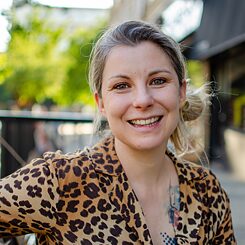 © Libby Heaney
Libby Heaney's post-disciplinary art practice includes moving image works, performances and participatory & interactive experiences that span quantum computing, virtual reality, AI and installation. Working, for the most part, at the intersections of quantum physics, machine learning & the visual, these disparate antecedents are employed & deployed to question orthodoxies—from received ideas about the body, gender & genius, to pop culture & class, alienation & solidarity, contemporary current political systems & rhetoric, nations & nationalism, science & art, and desire in the digital age—and explore alternatives. Libby has exhibited her artwork widely in galleries and institutions in the UK and internationally. She lives and works in London.
© Libby Heaney
Libby Heaney's post-disciplinary art practice includes moving image works, performances and participatory & interactive experiences that span quantum computing, virtual reality, AI and installation. Working, for the most part, at the intersections of quantum physics, machine learning & the visual, these disparate antecedents are employed & deployed to question orthodoxies—from received ideas about the body, gender & genius, to pop culture & class, alienation & solidarity, contemporary current political systems & rhetoric, nations & nationalism, science & art, and desire in the digital age—and explore alternatives. Libby has exhibited her artwork widely in galleries and institutions in the UK and internationally. She lives and works in London.Activities in collaboration with "New Forms of Togetherness":
Workshop: 07.07.2021
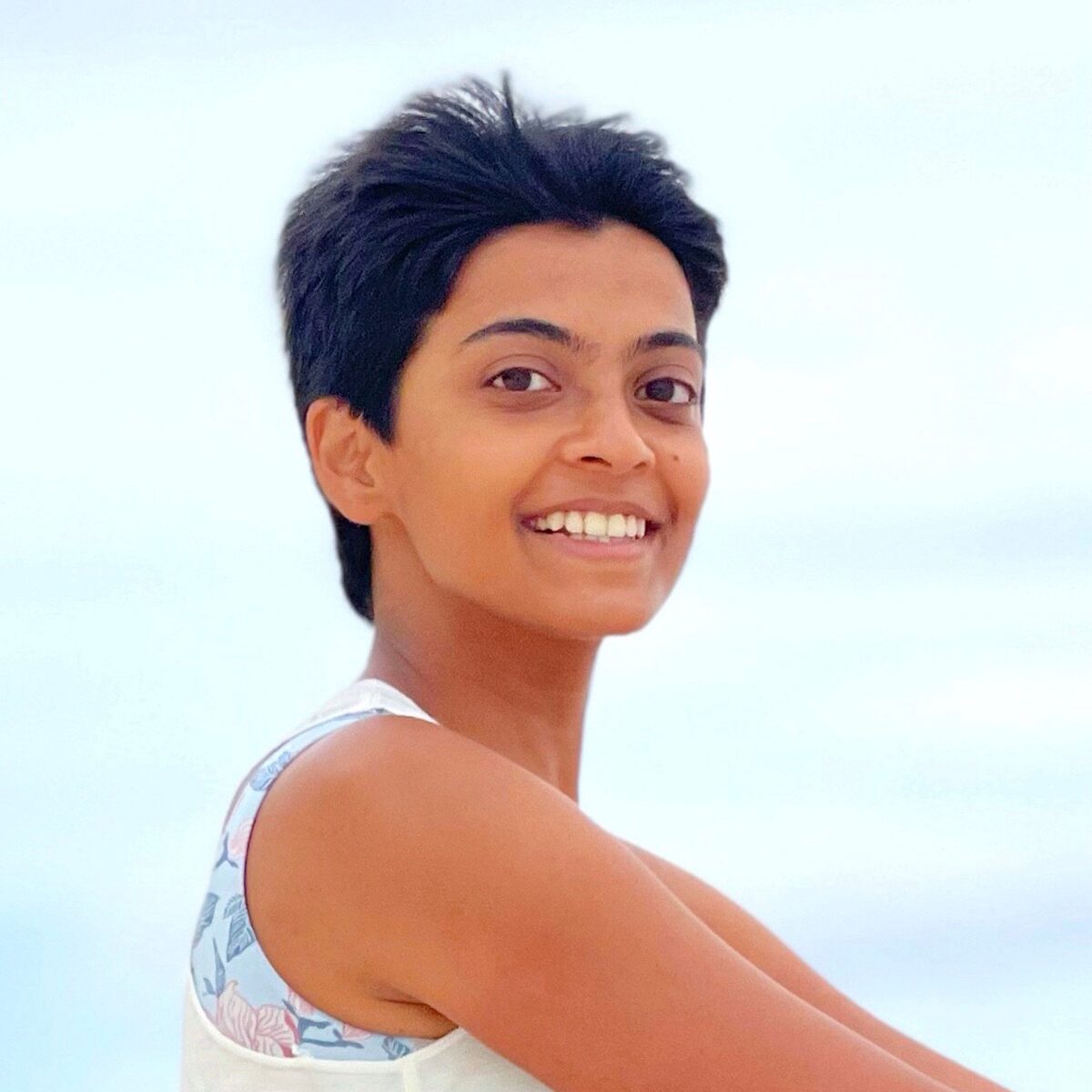 © Kohinoor Darda
Kohinoor Darda is a postdoctoral researcher in cognitive neuroscience based jointly at the University of Glasgow, UK, and Macquarie University, Sydney, in the Social Brain in Action (SoBA) Lab. In her research, she uses behavioural and brain imaging methods to investigate the cognitive and neural mechanisms underlying social interactions as well as aesthetic experiences when engaging with different forms of art. A trained Indian classical dancer, she likes to integrate science and dance in both her research and choreographic endeavours.
© Kohinoor Darda
Kohinoor Darda is a postdoctoral researcher in cognitive neuroscience based jointly at the University of Glasgow, UK, and Macquarie University, Sydney, in the Social Brain in Action (SoBA) Lab. In her research, she uses behavioural and brain imaging methods to investigate the cognitive and neural mechanisms underlying social interactions as well as aesthetic experiences when engaging with different forms of art. A trained Indian classical dancer, she likes to integrate science and dance in both her research and choreographic endeavours. Activities in collaboration with "New Forms of Togetherness":
continuous mentorship through the Social Brain in Action Lab
Activities in collaboration with "New Forms of Togetherness":
continuous mentorship through NEoN Digital Arts Festival
Back to New Forms of Togetherness